Who Is the NOCO Genius 5 Amp Smart Charger For?
The NOCO Genius 5 is a fantastic smart battery charger that is actually for most people.
It has a mode for regular lead acid batteries, Gel, AGM, Lithium, 12 volt, and 6 volt batteries. There’s even a repair mode.
Related Product: Keep your NOCO charger clean and safe with a NOCO Universal Genius Protection Case (click to view on Amazon)
The 5 amp output means it can be used to maintain high capacity deep cycle RV batteries.
Because it’s a smart charger it can also be used for lower capacity batteries like the kind used to start cars.
It’s a high end battery charger, but if you get something like the NOCO genius 5 you will be able to use it to safely charge most of the batteries you will come across.
That’s why it’s one of the best options out there for not just RVers, but anyone who owns a car, ATV, motorcycle, boat, or anything with a large battery that occasionally needs a charge.
NOCO Genius 5 Amp Smart Charger
NOCO Genius 5 For RV Batteries
We recently winterized our RV and needed a high quality smart charger for the large VMAX 12 volt 125 ah deep cycle AGM battery (click to view on Amazon) and the 12 volt engine starter battery.
Usually, we have the RV battery hooked up to a solar panel on the roof, and a 40 amp solar charge controller (click to view on Amazon) that does a good job of keeping it fully charged and healthy.
But now that the RV is in temporary storage under a roof the solar panel charging system doesn’t work.
The main issues with our high capacity VMAX AGM deep cycle battery are what it’s made with (AGM) and the 125 amp hour capacity.
A small 1 amp smart charger can technically charge our RV battery slowly, but there is a risk of straining the charger, especially if it ever gets drained completely.
See Aslo: Best Deep Cycle Battery Chargers Reviewed (12V, 6V, RV, AGM)
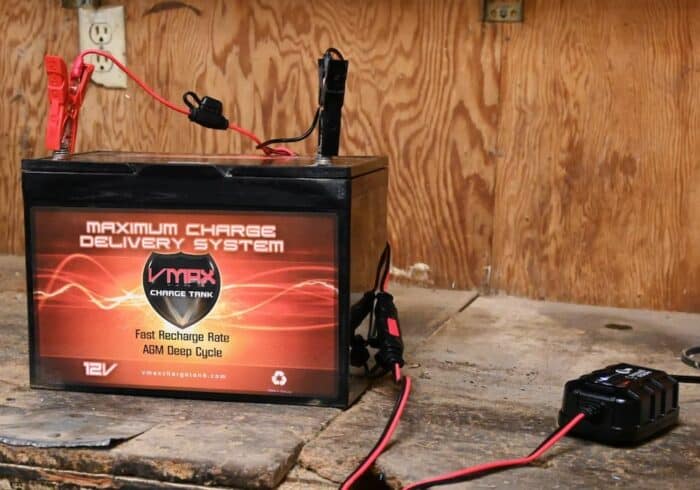
I wanted a battery charger that could handle the strain of a large capacity battery and also work with AGM.
The NOCO Genius 5 amp hour smart charger is rated for batteries up to 120 amp hours. Even though our VMAX is 125 amp hours, the 120 rating is close enough to work.
Especially because NOCO is one of those brands that makes excellent quality chargers, so I was confident it would be able to handle the extra 5 amp hours.
Over this past month that I’ve been testing and using the NOCO Genius 5, so far I’ve been right about its ability to charge and maintain a 125 amp hour AGM battery.
NOCO Genius 5 Features
There’s a lot packed into the NOCO Genius 5 amp smart charger. Especially for how small and portable it is.
In this section I’ll outline some of the basic features.
If you want to read my review and see the results of my testing when charging a deep cycle AGM battery scroll down to the next section.
See Also: Keep Motorhome Chassis Battery Charged When RV Park Living
Compatible Battery Types
The NOCO Genius 5 is a universal battery charger that can safely charge pretty much any battery a person will come across.
The biggest limiting factor is the size of battery it can charge, but I’ll get to that later.
Here’s a list of every kind of battery the NOCO Genius 5 can charge.
- 12 Volt
- 6 Volt
- Flooded Lead Acid
- SLA
- AGM
- Gel
- VRLA
- Lithium-ion (lifepo4)
All of these batteries include automotive, RV, starter, marine, power sports, and more. So long as the charge current is compatible with the battery, the NOCO will be able to safely charge or maintain it.
Note: the NOCO Genius 5 is not compatible with 6V AGM batteries.
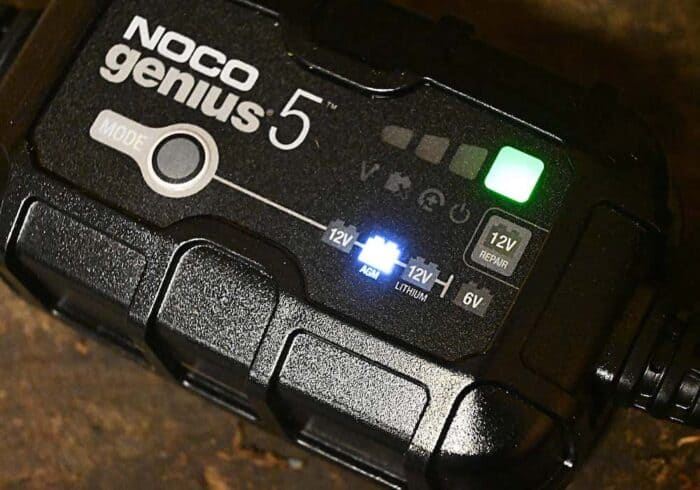
Charging Modes
There are 5 main preset charging modes: 12V, AGM, Lithium, 6V, and 12V Repair.
When you choose the correct mode for the type of battery you want to charge, the NOCO will automatically sense what current is required for the best and safest charge.
The automatic feature makes it really easy to set up and leave connected to a battery.
It’s a worry free system and the main reason you should always use a high quality smart charger like this on any kind of battery.
One thing to note about the repair mode. This mode tries to repair a battery by increasing the charge voltage to a point where the liquid inside will start to boil.
This helps remove build up on the plates inside the batteries which is the main reason the charge capacity decreases over time if the battery is not held at a charge above 20-50%
Never use the repair mode on a sealed battery like a GEL, AGM, or lithium-ion.
Repair mode is for flooded lead acid batteries only.
Also, the lithium-ion mode is for batteries that have a BMS (battery management system). Luckily most high quality Lithium batteries do have a built-in BMS.
If the power goes out when the charger is connected to a battery it will automatically go back to the last mode it was in.
This means you don’t have to worry about it switching to 12 volt mode after a blackout when you’re charging an AGM or lithium battery.
Dead Battery Charging
Many battery chargers won’t start charging a battery that is completely dead (less than 1 volt of charge) because it won’t recognize the battery as a viable hookup to start charging.
To solve this problem the NOCO Genius 5 has a special feature called Force Mode.
When you manually turn on force mode it overrides the feature that tests for a viable battery. You basically force the charger to output current.
See Also: When To Charge A Deep Cycle Battery
To use the force mode hold down the “Mode” button for 5 seconds.
Once force mode has been entered it will charge in force mode for 5 minutes. Then it will switch to standard charging to fully charge the battery.
If you are charging an AGM, Lithium, or 6V battery make sure you wait until force mode is complete, then select the correct mode for the type of battery.
Battery Diagnostic
The NOCO Genius 5 offers some diagnostic features that will test for any issues the battery might have before charging.
The diagnostics include over voltage, bad battery (battery will not hold a charge), and reverse polarity (clamps were put on wrong terminals).
Each error has its own symbol on the face of the charger that will illuminate when a problem is detected.
Charge Current
NOCO recommends using this charger for batteries that are no more than 120 amp hours.
We have it on a 125 amp hour battery, so it’s ok to go over a few amp hours. Espeically if you are using the charger to maintain batteries that are fully or mostly charged already.
Here’s a chart with each mode’s charging voltages.
| 12 Volt | 12V AGM | 12V Lithium | 6V | 12 Volt Repair | Standby Mode |
| 14.5V | 14.8V | 14.6V | 7.25V | 16.5V | oV |
Temperature affects the voltages of batteries quite a bit. To combat changing temperatures the NOCO will automatically sense the temperature and adjust the charge voltage accordingly.
For example, when it’s hot outside it will lower the charge voltage and raise it when it’s freezing.
This will stop the battery from being under or overcharged.
See Aslo: How To Install Solar Panel On RV Roof & Connect To Battery
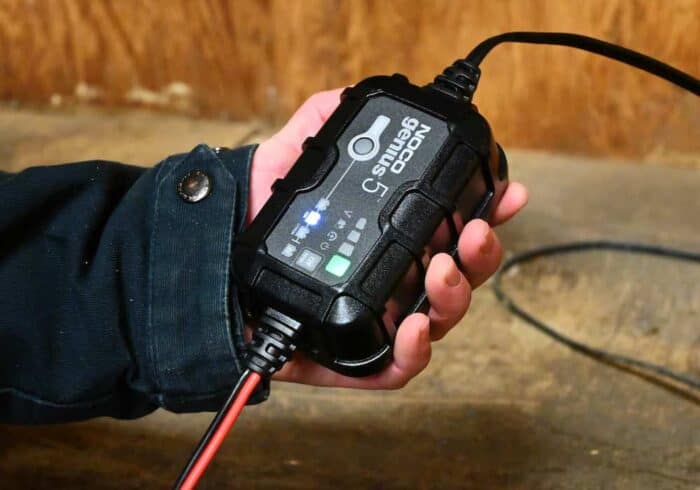
Size & Durability
For a 5 amp charger, the NOCO Genius 5 is very small.
The unit is only 4 1/2 inches long, 3 inches wide, and 2 inches tall.
The power cable is 6 feet long. The battery cable is over 4.5 feet long. There’s a 2 prong connector on the end of the charger cable you use to plug the battery clamps onto.
The cable for the included battery clamps is almost 2 feet long.
The clamps have a built in 10 amp blade fuse and you can remove the clamps and use the integrated eyelets for a more permanent connection.
NOCO chargers can be used both indoors and outdoors. The body is waterproof with an IP65 rating.
There’s a wall mount bracket and screws also included with purchase.
See Also: Best Portable Solar Panel Charger For RV Camper/Boondocking
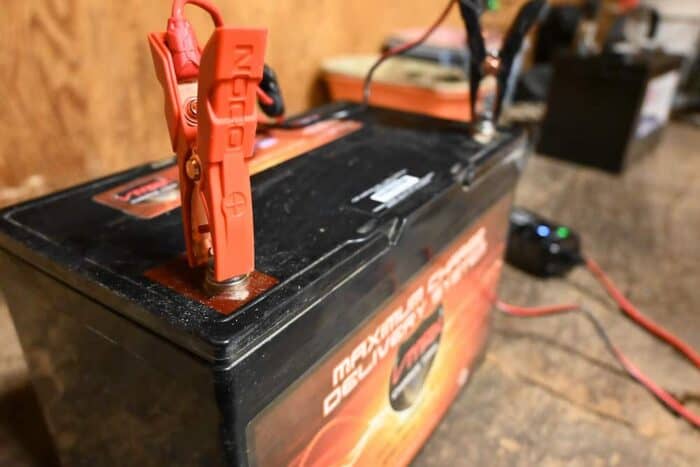
AGM RV Battery Test
We purchased the NOCO Genius 5 (click to view on Amazon) to charge both the 12 volt engine battery in our motorhome and the AGM house battery.
It handled the standard 12 volt automotive battery with no issues but I wanted to test the AGM battery to make sure the extra 5 amp hours wouldn’t be a problem.
According to the information on our VMAX AGM battery, the charge voltage should be 14.4-14.9 volts and the float voltage (fully charged voltage) should be 13.5-13.8 volts.
The VMAX had been sitting in our RV for a few weeks, and since the solar panel was covered it wasn’t getting charged and was slowly being drained by the propane alarm.
It was at about 65% capacity when we connected it to the NOCO Genius 5.
While charging it I checked the voltage and was happy to see that it quickly reached the correct charge voltage (14.56V when I measured it).
See Also: Best Portable Power Station/Solar Generator For Camping
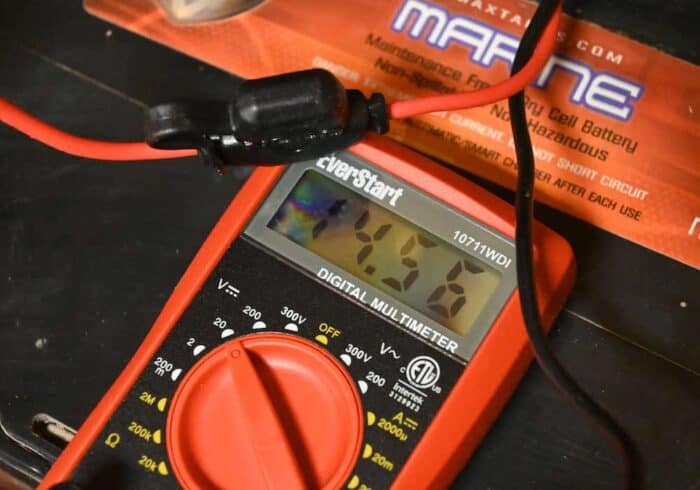
I left the battery plugged in and connected to the RV battery in AGM mode for a few days.
I disconnected the charger and waited about 30 minutes before checking the battery voltage so it would be rested and give a good reading.
When I checked the voltage it was at 13.7 volts and well within the fully charged range.
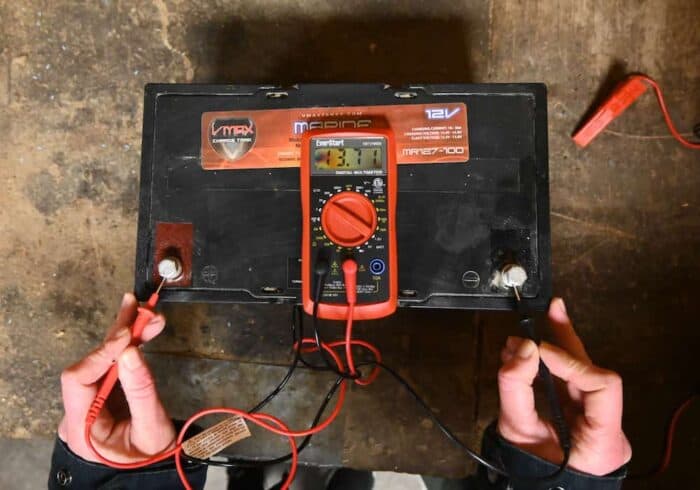
The NOCO has been maintaining my AGM battery in freezing temperatures for about a month now, and so far everything seems to be working as it should.
NOCO Genius 5 Review
I can confidently say that the NOCO Genius 5 (click to view on Amazon) is a great choice to charge and maintain high capacity 12 volt AGM batteries.
It was incredibly easy to set up and the instructions were clear and well written.
I like that it came with both alligator clips and eyelets. I also appreciate the 10 amp blade fuse because it’s a great added safety feature and not something manufacturers usually add to chargers.
See Also: How To Wire Multiple 12V Or 6V Batteries To An RV
I like that the charging unit isn’t located in the plug like a lot of other chargers. It’s easier on the outlet and it makes the charger a lot more portable.
The power and charging cables are long so it could be connected to a car battery in a garage without having to use an extension cable.
Overall I think it’s a fantastic choice and NOCO has once again impressed me with its excellent products.
Have any questions about the NOCO Genius 5 amp battery charger? Leave a comment below.



good review man appreciate it. looking to purchase a noco genius 10 or a 2×4
Do you think it would be safe to repeat the Repair Cycle in order to optimize performance on an ageing 12v 45 amp/hr flooded car battery? Is there a danger of the electrolyte evaporating?
Have completed one repair mode cycle but on a later charge the green light pulsed indefinitely, suggesting the charger cannot complete.
Hi James,
Open the cell caps and check the water levels inside your batteries, they may need a refill with distilled or deionized water.
Once you’ve refilled the cells, it’s ok to run the repair cycle again.
Make sure you refill the cells after each repair cycle.